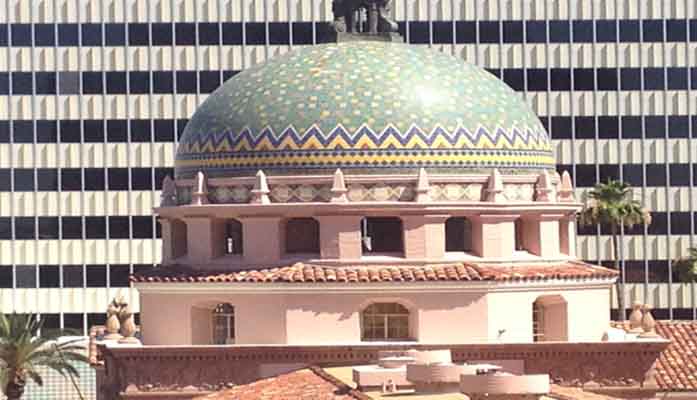
by Daniel Stefanski | Mar 9, 2024 | News
By Daniel Stefanski |
Arizona legislators continue to work on solutions to help their constituents afford and own their own homes.
On Wednesday, the Arizona State Senate passed HB 2570, the Arizona Starter Homes Act, with a bipartisan vote. The bill, which was sponsored by Senate Majority Leader Sonny Borrelli and House Majority Leader Leo Biasiucci, “creates municipal prohibitions relating to home designs and single-family home lot sizes” – according to the overview provided by the chamber.
“Hardworking Arizonans are finding it increasingly difficult to purchase their first home and begin their pursuit of the American dream. This legislation is a step in the right direction in bringing prices down by eliminating some of the restrictive government red tape and expensive regulatory constraints being passed onto homebuyers,” said Senator Borrelli. “Government should do everything in its power to make the lives of our citizens better, but local municipalities are overstepping their authority by trying to control private property rights, instead of focusing their attention on valid rules and regulations protecting against nuisance and safety issues. The Arizona Starter Homes Act is a no-brainer, and I’m encouraged it received bipartisan support. I look forward to the Governor taking appropriate action on behalf of our citizens’ lives and livelihoods by signing this bill into law.”
The bill passed the Senate with a 16-13 vote. One member did not vote.
Last month, the Arizona House of Representatives approved the proposal with a 33-26 vote (with one vacant seat).
Senator Anna Hernandez, a Democrat, applauded the passage of the legislation from her chamber, writing that the result “is amazing for all Arizonans!”
Earlier this week, Democrat State Representative Analise Ortiz stated that this bill “provides the best opportunity for the American dream of homeownership.” She added that “we don’t have to be ‘forever renters,’” and that “our generation deserves to own a home & build generational wealth.”
While the support in the legislature for this piece of legislation is bipartisan, towns and cities around the state have indicted strong opposition to its proposed policies. On the Arizona Legislature’s Request to Speak system, representatives from the cities of Prescott, Scottsdale, Avondale, Goodyear, Sedona, Flagstaff, Eloy, Mesa, Buckeye, Chandler, Litchfield Park, Glendale, Tucson, and Yuma; as well as from the League of Arizona Cities & Towns, Chandler Chamber of Commerce, and Queen Creek Chamber of Commerce, signed in to oppose the bill. Representatives from the Arizona Neighborhood Project, Republican Liberty Caucus of Arizona, Home Builders Association of Central Arizona, and the Arizona Homeowners Coalition indicated their support for the legislation.
HB 2570 now heads to Governor Katie Hobbs’ desk for a decision on its fate.
Corinne Murdock is a reporter for AZ Free News. Follow her latest on Twitter, or email tips to corinne@azfreenews.com.

by Daniel Stefanski | Mar 8, 2024 | News
By Daniel Stefanksi |
Arizona Republican Legislators were on the winning side of a unanimous decision at the U.S. Supreme Court.
On Monday, the Supreme Court of the United States reversed the opinion from the Colorado State Supreme Court that “ordered the Colorado secretary of state to exclude the former President from the Republican primary ballot in the State and to disregard any write-in votes that Colorado voters might cast for him.” The Court unanimously ruled that “the judgement of the Colorado Supreme Court cannot stand” – though two concurring opinions (one by Justice Barrett and one by Justices Sotomayor, Kagan, and Jackson) gave additional thoughts and context to the deliberations from the panel.
The decision from the nation’s high court follows an amicus brief that was submitted from more than two dozen state attorneys general and the Arizona Legislature under the leadership of Senate President Warren Petersen and House Speaker Ben Toma. That brief urged the U.S. Supreme Court to consider that “dangerous ruling out of Colorado.”
After the news of the 9-0 decision was announced, the Arizona Senate Republicans Caucus “X” account posted, “Colorado got it wrong. President Warren Petersen and the Arizona Legislature are proud to have supported President Donald Trump by filing a brief with more than two dozen other states. Today the U.S. Supreme Court agreed with us and unanimously overturned Colorado’s attempt to disenfranchise voters by keeping President Trump off the ballot.”
When the Legislature joined the amicus brief in the lead-up to the arguments before the U.S. Supreme Court, Petersen had said, “This is clearly a case of judicial activism and a violation of the separation of powers. Leftist bias and prejudice are on full display from the Colorado Supreme Court.” His press release asserted that the U.S. Constitution “reserve[d] the power to determine the political question of what constitutes an ‘insurrection’ to Congress – not rogue courts.”
The Petersen and Toma-led legislature has been active in joining legal fights around the nation and in-state – especially in the absence of an attorney general who is not generally favorable to Republicans’ perspectives of different cases.
Daniel Stefanski is a reporter for AZ Free News. You can send him news tips using this link.

by Corinne Murdock | Mar 8, 2024 | News
By Corinne Murdock |
Pima County officials are warning that the community will suffer from a homeless crisis of illegal immigrants come Easter Sunday after federal funding for illegal immigrant support runs out.
County officials estimate that there will be as many as 400 to 1,000 illegal immigrants released by border agents into Tucson daily.
The county has spent about $1 million a week to shelter around 1,000 illegal immigrants — bussed in by state-contracted coach transportation — using funds sourced from the federal Shelter and Services Program. If the county were to take on all the sheltering and service costs, taxpayers would be putting up between $50 and $60 million a year.
About a billion in federal funding for SSP was tied into the failed foreign aid bill engineered by Sen. Kyrsten Sinema (I-AZ). SSP was specifically allocated by the Department of Homeland Security (DHS) to mitigate illegal immigrant shelter and service costs borne by non-federal entities.
The Federal Emergency Management Administration (FEMA) allocated $363.8 million to SSP for the 2023 fiscal year. Pima County received over $12 million from SSP. These funds went to Catholic Community Services’ (CCS) Casa Alitas shelters, which served as a middle man of sorts amid the Border Patrol’s catch and release of illegal immigrants. Without federal funds, illegal immigrants will likely end up living on the streets.
The World Hunger Ecumenical Task Force (WHETF) in Maricopa County received nearly $8.5 million. WHETF of Cochise County received $150,000, and Yuma County WHETF received over $11 million.
Last month, Pima County Administrator Jan Lesher warned the Board of Supervisors (BOS) in a memo that the county no longer had sufficient funding to continue shelter and other services for illegal immigrants.
Lesher advised the board that she had instructed a full stop to county coordination, contracts management, and funding reimbursement of the shelter services on Easter Sunday. Currently, the county’s Grants Management and Innovation Office, Office of Emergency Management, and Procurement are winding down those processes.
The county administrator explained that illegal immigrants would flock to Tucson from across Pima, Cochise, and Santa Cruz counties because the city offers more transportation opportunities and homelessness support than the rural counties.
“There is already a difficult homeless problem in Pima County that we are working tirelessly to solve or mitigate,” said Lesher. “What we are about to experience with street releases is homelessness on steroids.”
The county is considering two plans for handling the anticipated influx of roving illegal immigrants. However, Lesher advised against any of the plans as “imprudent,” arguing that the border crisis was a federal problem that should be covered by federal funding.
“This is a crisis of the federal government’s making due to the failure to pass sensible border and immigration reform and to provide the necessary funding to local jurisdictions forced to deal with the deleterious effects of federal border policy,” said Lesher.
The first plan would involve a county-owned building, the Mission Facility west of the Pima County Adult Detention Complex. One version of the plan would cost over $126,000 a month and another $40,000 for necessary materials. The illegal immigrants would be bussed and released to the location, and upon arrival given only the “bare necessities:” utilities, maintenance, janitorial services, 24-hour security, and communication aids such as an A-frame sign and language-specific cards and fliers. Under this plan, the county would not provide food or transportation. A second version of the plan would increase costs to over $396,900 a month to provide support staffing and food, but not transportation.
The second plan would make use of the county-owned Pima Fairgrounds “Raceway” and install the rental of a large tent and portable showers. That would cost $305,100 to erect and about $283,200 to maintain monthly, minimum. Additional costs have yet to be discerned.
Of the five viable non-county buildings and properties, the owners either expressed no interest in housing illegal immigrants or the properties were unsuitable for mass sheltering operations.
Among the services discontinued, per a memo issued to the BOS earlier this month, will be both the short and long-distance transportation services for asylum seekers (ending August 15 and April 11, respectively), staffing support services for humanitarian assistance program (ending May 11), and food service county congregate and non-congregate shelters (ending May 31). Another program, hotel shelter services for COVID-positive asylum seekers, will conclude next week.
Although those dates extend beyond Lesher’s directive to stop county efforts as of Easter Sunday, the county administrator noted in her February memo to BOS that she was planning for the possibility of reimbursement requests coming in after the programs conclude.
Per the county administrator’s last weekly situational report, issued in mid-February, there was a daily average of 910 arrivals and weekly average of over 6,300 arrivals. Since Jan. 1, 2019, the county has recorded over 405,000 releases in the area.
Corinne Murdock is a reporter for AZ Free News. Follow her latest on Twitter, or email tips to corinne@azfreenews.com.

by Corinne Murdock | Mar 8, 2024 | News
By Corinne Murdock |
A Scottsdale priest, Fr. Don Kline of St. Bernadette Catholic Church, urged the public to decline to sign a petition advocating for the total legalization of abortion up to birth.
Fr. Kline issued his stance in a statement for the advocacy group, Decline to Sign. The priest encouraged Arizonans to inform abortion advocates seeking signatures that abortions take the life of unborn children, and to inform their neighbors and peers about the petition circulating. Fr. Kline concluded his remarks with a prayer.
“When moments like this happen in our history we know that there is evil present and we need to invite God to be present and to give us the strength to confront this evil,” said Fr. Kline. “We pray, Lord, for the wisdom and the courage to do what we need to do to support these mothers, especially those who are suffering, who are afraid, who are not sure what to do. Raise up good people to support them, that they may be open to life, to the gift of life that God has blessed them with.”
Decline to Sign arose in response to the petition launched by Arizona for Abortion Access (AAA) to put total abortion legalization as a proposed constitutional amendment on the November ballot. The state currently allows abortions at up to 15 weeks’ gestation.
Fr. Kline and the local clergy aren’t alone in their opposition to the petition.
Last week, Senate President Warren Petersen (R-LD14) and all GOP senators signed and released a statement, the Arizona Right to Life Declaration, urging Arizonans to refuse to sign AAA.
“[I]t is an assault on God’s value and sovereignty regarding the sanctity of human life,” reads the declaration.
AAA’s proposed ballot question would create a “fundamental right to abortion,” meaning it would prohibit the denial, restriction, or intervention with an abortion even after fetal viability if a healthcare professional determines that the unborn child presents a threat, either to her mother’s mental or physical health. The petition defined fetal viability as sustained survival outside the womb without the intervention of “extraordinary medical measures.”
The proposed ballot question has the backing of the state’s top Democratic leaders: Gov. Katie Hobbs signed the petition in December, and a number of leading progressive organizations have issued their endorsements including ACLU of Arizona, Affirm Sexual and Reproductive Health, Healthcare Rising Arizona, Arizona List, NARAL Arizona, and Planned Parenthood Advocates of Arizona (PPAAZ).
AAA has until July 3 to gather nearly 384,000 valid signatures to put the initiative on the ballot.
At the helm of AAA are leaders in the pro-abortion movement such as former PPAAZ chair Chris Love and NARAL Arizona senior advisor Jodi Liggett, and the Tempe-based abortionist Candace Lew. The group also has the campaign finance assistance of one of the key players in Arizona’s Democratic dark money network, Dacey Montoya.
According to Arizona campaign finance records, over $4.5 million of AAA’s $5.8 million in funding has come from out of state advocacy groups:
- Over $3.1 million from the Fairness Project, based in Washington, D.C.;
- $1 million from Advocacy Action Fund, based in California;
- $250,000 from Think Big America, based in Illinois;
- $150,000 from The Green Advocacy, based in Washington, D.C.;
- $20,000 from Our Children Our Future, based in California
Over $1.1 million came from Arizona-based organizations and individuals: $600,000 from Arizonans Fed Up With Failing Health; over $278,300 from Healthcare Rising Arizona; over $117,100 from PPAAZ; $100,000 from Paradise Valley philanthropist Juanita Francis; $21,300 from Arizona List; $10,000 from philanthropist and medical marijuana doctor Gina Berman; $10,000 from Lew; and $5,050 from Reproductive Freedom for All Arizona.
Corinne Murdock is a reporter for AZ Free News. Follow her latest on Twitter, or email tips to corinne@azfreenews.com.

by Corinne Murdock | Mar 7, 2024 | News
By Corinne Murdock |
Senate candidate Kari Lake sustained several blows in court this week: a withdrawal of her appeal for access to Maricopa County’s 2022 election ballot envelopes, and the denial of her petition to dismiss Maricopa County Recorder Stephen Richer’s defamation lawsuit.
The former gubernatorial candidate filed the withdrawal on Monday in her case seeking access to Maricopa County’s ballot envelopes from the contested 2022 election (CV2023-051480). A similar, separate lawsuit from the Glendale-based nonprofit We the People AZ Alliance (WTPAA) remains active.
Maricopa County Recorder Stephen Richer expressed relief to AZ Free News that the county attorney’s office had one less election dispute case to manage, though he noted that other cases involving Lake remain. The attorney for both Lake and WTPAA’s cases, Bryan Blehm, didn’t respond to our request for comment by press time.
“She lost. We won. The same could be said of every case Kari has brought against my office or the Board of Supervisors (and there have been many). We follow the law. Period,” said Richer. “For anyone curious about allegations of election or public records misconduct, and who’s following the law and who’s not, these cases offer a very clear answer.”
Three other cases have been filed by Lake involving Richer, none of which have yielded any wins: CV2022-014827, which sought remedy for those disenfranchised by the mass ballot equipment malfunctions on Election Day, was voluntarily dismissed in November 2022; CV2022-015519, which sought access to Election Day voting records, was dismissed without prejudice; and CV2022-095403, which challenged the validity of the 2022 election declaring Lake’s opponent, Gov. Katie Hobbs, the winner. In the latter, the Arizona Supreme Court rejected most of Lake’s claims last March, with the trial court rejecting the remaining claim in May. Lake promptly filed an appeal.
Monday’s action came after several months of waiting on the candidate’s next move, after she promised an appeal. Last December, the Maricopa County Superior Court denied Lake’s petition to obtain the 2022 Maricopa County ballot envelopes. Judge John Hannah said that the release of the ballot affidavit envelopes would result in harm to individual voters, such as voter fraud, harassment, and identity theft, due to the inclusion of voter signatures alongside voters’ names, addresses, and telephone numbers.
“Disclosure of the ballot affidavit envelopes therefore would create a risk of widespread fraud where none exists at present,” said Hannah.
Another legal battle persists between Richer and Lake. On Tuesday, the Arizona Supreme Court allowed Richer’s defamation lawsuit against Lake to proceed to trial.
Richer sued Lake last June, alleging that the Senate candidate had “falsely and with actual malice” accused him of intentionally printing the wrong size of ballots and inserting 300,000 illegal or invalid early-vote ballots during the 2022 general election.
In her unsuccessful motion to dismiss, Lake argued that her claims constituted legitimate concerns about the 2022 election.
In response to the development in his defamation case, Richer posted on X that Lake had made specific, easily falsifiable claims that she knew were false.
“Words matter,” said Richer. “[T]hose false claims — broadcast to millions of people, often while seeking donations — had, no surprise, a very material impact on me and mine.”
Richer later declared that his team of over 15 attorneys had built a strong case with favorable precedence.
Corinne Murdock is a reporter for AZ Free News. Follow her latest on Twitter, or email tips to corinne@azfreenews.com.

by Corinne Murdock | Mar 7, 2024 | News
By Corinne Murdock |
The Arizona Free Enterprise Club (AFEC) is urging the Arizona legislature to appeal a ruling from the Arizona District Court striking down portions of two laws requiring proof of citizenship from voters. AFEC lobbied for and assisted in the drafting of the contested laws; now, it says it plans to file briefs in support of the appeals it hopes the legislature will file. The state has over 19,000 federal-only voters who haven’t submitted proof of citizenship.
Federal judge Susan Bolton ruled last week against provisions within HB2492 and HB2243 requiring proof of birthplace for voter registrations, investigations by county recorders based on the belief a voter is a noncitizen, and the voter’s disclosure of residence in order to register for federal elections. AFEC President Scot Mussi said in a press release that while it was a relief Bolton didn’t overturn the laws in their entirety, the provisions she did strike down were consequential.
“Though Arizonans can take solace in the fact that an activist judge didn’t completely dismantle these reasonable and commonsense laws, we are extremely disappointed in her decision to strike down several lawful provisions that we expect will be upheld on appeal,” said Mussi. “Officials across all branches and jurisdictions of our government should be working to uphold the integrity of our laws and to ensure that the votes of American citizens are not canceled or compromised by even a single illegal vote.”
Although Bolton struck down core provisions of the laws, she disagreed with the claims of activist groups that the legislators passed them with racist intent. However, Bolton did write that AFEC’s language in lobbying materials distributed to legislators was potentially discriminatory against Latinos. Per court documents, AFEC referred to illegal immigrants as “illegals.”
“[AFEC] disseminated lobbying materials by email to Arizona legislators that described how the Voting Laws would prevent ‘illegals’ from voting in Arizona elections,” said Bolton. “[T]he use of ‘code words’ may demonstrate discriminatory intent, and the term ‘illegals’ can evince racial animus for members of the Latino community in Arizona.”
“Illegals” is slang for individuals of any race and any country who migrated into the U.S. illegally, meaning the term isn’t restricted in its scope to Latino illegal immigrants.
Mussi also stated in AFEC’s press release that Bolton’s assessment amounted to a false accusation of discrimination. He said Bolton’s implication of racism was “laughable” considering that the illegal immigrants causing the border crisis have hailed from nearly all countries across the globe.
“It is outrageous that Judge Bolton would use an official court opinion to falsely accuse concerned and law-abiding American citizens of having racist intent in our efforts to pass legislation to strengthen election integrity in this state,” said Mussi. “This accusation is especially laughable when we consider the state of the open border, where millions of men, women, and children from more than 160 countries of origin have illegally crossed into America – many of whom are taking up residence and receiving benefits on the backs of hardworking taxpayers. It shouldn’t take a grassroots advocacy organization to point out the constitutional responsibility of a federal court, yet sadly, this is the present state of our nation.”
Corinne Murdock is a reporter for AZ Free News. Follow her latest on Twitter, or email tips to corinne@azfreenews.com.






